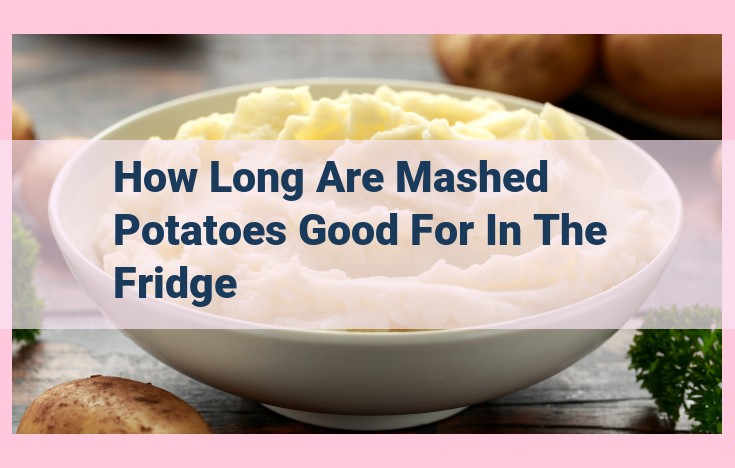Maximize Freshness: Storing Mashed Potatoes For Optimal Flavor And Nutrition

Mashed potatoes stored properly in an airtight container in the refrigerator can last for about 3-4 days. However, it’s important to note that the quality and taste may slightly deteriorate over time, so it’s best to consume them within this timeframe for optimal freshness and flavor.
Kitchen Best Practices: Ensuring Potato Safety
In the culinary world, potatoes reign supreme, offering versatility and nourishment. Yet, like any food item, safe handling is paramount to prevent potential health hazards. Here’s a comprehensive guide to kitchen best practices for handling potatoes:
Seasonings: A Flavorful Hazard
Seasonings elevate the taste of potatoes, but improper storage poses risks. Keep seasonings tightly sealed and store them in a cool, dry place. Never dip a spoon directly into a seasoning jar to avoid contaminating the entire contents. Instead, use a dedicated spoon for each seasoning.
Kitchen Appliances: Clean Warriors
A well-maintained kitchen is essential for safe potato preparation. Thoroughly wash knives, cutting boards, and other utensils after handling raw potatoes. Clean surfaces with a disinfectant spray or wipes to eliminate bacteria.
Storage Containers: Potatoes’ Safe Haven
Storing potatoes properly is crucial for their longevity. Use well-ventilated containers or paper bags with ample holes to prevent moisture build-up. Avoid storing potatoes in plastic bags, as they can trap moisture and encourage spoilage. Keep potatoes in a cool, dark, and dry place to maintain their freshness.
Food Safety Measures: Handling Potatoes Safely
When it comes to our food, we all want to ensure that it’s safe and wholesome for consumption. Potatoes, a staple in many cuisines worldwide, are no exception. To keep these spuds safe and delicious, it’s crucial to follow proper food safety measures.
Washing and Cooking Techniques
Before preparing potatoes, thoroughly wash them under cold running water to remove any dirt, debris, or bacteria. Use a clean brush to scrub away any stubborn grime. It’s also essential to cook potatoes to the proper temperature to kill any harmful microorganisms. For boiled potatoes, ensure they reach a minimum internal temperature of 165°F.
Health Risks Associated with Improper Handling
Improper handling of potatoes can lead to potential health risks. One of the most common dangers is food poisoning caused by bacteria like Salmonella or E. coli. These bacteria can contaminate potatoes through contaminated soil, water, or equipment. Symptoms of food poisoning may include nausea, vomiting, diarrhea, and fever.
In extreme cases, improperly handled potatoes can cause more severe health issues. For example, green potatoes contain solanine, a toxic compound that can lead to neurological problems and gastrointestinal distress. It’s essential to discard any potatoes that have turned green to avoid these risks.
Proper Storage and Handling of Potatoes
Storing and handling potatoes properly is crucial for preserving their quality and minimizing the risk of spoilage. Let’s delve into the right storage and handling techniques for potatoes:
Potatoes
- Cool and Dark: Potatoes thrive in a cool, dark, and well-ventilated environment. Store them in a pantry, root cellar, or cupboard where temperatures range between 45-50°F (7-10°C). Avoid exposing them to direct sunlight, as it can turn them green and produce the toxic compound solanine.
- Paper Bags or Cardboard Boxes: Use paper bags or cardboard boxes for potato storage. These materials allow for proper airflow, preventing moisture buildup and spoilage. Avoid using plastic bags, which can trap moisture and promote rot.
- Avoid Bruising: Handle potatoes with care to prevent bruising or damage. Bruises provide entry points for bacteria and hasten deterioration.
Dairy Products
When handling dairy products in conjunction with potatoes, certain precautions must be taken to avoid cross-contamination:
- Separate Storage: Store dairy products, such as milk or cheese, separately from potatoes in the refrigerator. Keep them in closed containers to prevent any potential contamination.
- Thorough Cleaning: Thoroughly clean surfaces, utensils, and containers that have come into contact with dairy products before using them for potatoes. This step helps prevent the transfer of bacteria from dairy products to potatoes.
- Proper Cooking: Cook dairy-based potato dishes to an internal temperature of 165°F (74°C) to ensure the destruction of any harmful bacteria.